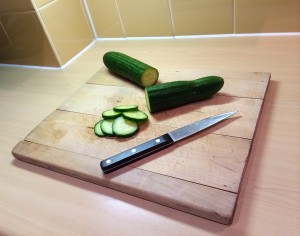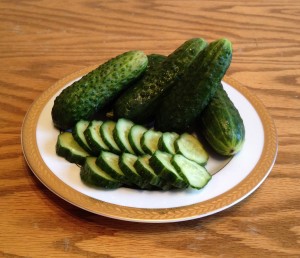There’s nothing quite like a cucumber. Don’t laugh! The amusingly shaped and humble salad-filler just happens to be a super food extraordinaire.
Reports claim that slices of it can do everything from transform a side dish and freshen the breath, demystify the bathroom mirror, oil a squeaky hinge, polish sinks and shoes, to dissolving ink and keeping pests off your flower beds. Handy.
In health terms, it’s even better. Sources abound claiming cucumbers can help prevent hangovers and headaches, lower stress, improve the appearance of cellulite and wrinkles, reduce inflammation – and even help cure cancer. Not for nothing have generations of ladies lain down for a little R&R with a slice of the green stuff on each eyelid.
Originally from southern Asia, the “cucumis sativus” is now cultivated globally. Like tomatoes, pumpkins and courgettes, the cucumber is actually a fruit, though prepared like a vegetable, and around 95% water.
The rest is traces of vitamins B1, B2, B3, B5, B6, Folic Acid, plus C and K, as well as a tiny amount of the minerals calcium, iron, magnesium, manganese, phosphorus, potassium and zinc. But aside from this breathless list of minor boons, cucumbers also have other more powerful properties.
As a diuretic, they help eliminate water. They also contain an enzyme that breaks up protein and cleanses the intestines, while its juice soothes any internal inflammation and sore throats. However, a lot of its clout lies in its coat.
Cucumber skin is rich in silicon, which is found in almost every tissue in the body as the trace mineral silica. This is essential for cell growth and strengthening the body’s connective tissues – muscles, tendons, ligaments, cartilage and bone. Moreover, it’s also vital for healthy skin, lustrous slow-to-grey hair and strong nails – hence why silica is often hailed as the “beauty mineral”.
Other reported benefits of this wonder substance, either eaten or externally applied, include the treatment of heartburn, ulcers and digestive disorders, varicose veins, hardened arteries, bronchitis, receding gums and allergic rashes.
On the flip side, a silica deficiency can reduce the skin’s elasticity and hamper the body’s ability to heal wounds.
Aside from cucumbers, nutritionists recommend other silica-rich food sources such as onions, leeks, green beans, strawberries, mango, rhubarb, celery and asparagus. Add to these oats, millet, barley and whole wheat, as well as the herb horsetail, and beetroot – and you have one of the many reasons why there’s a crop of Cardeal growing rather nicely in my allotment. Cukes are next.
Cucumbers: One of Mother Nature’s anti-inflammatory, detoxifying and anti-ageing beauty foods. You can even buy them in halves. And cheaper than chips.




Comments are closed.